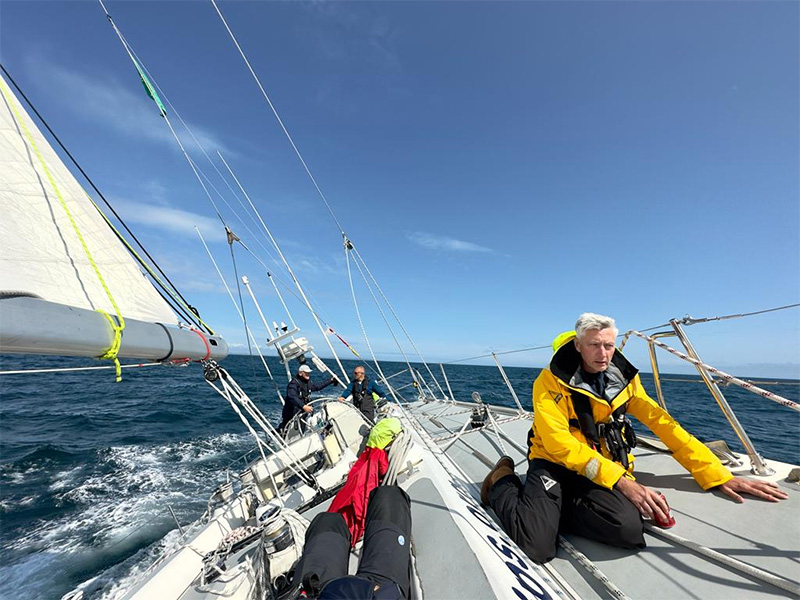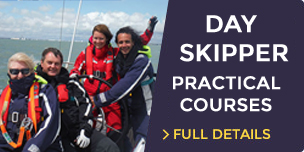Do You Need a License to Drive a Boat?
820 views | June 20th, 2024
One of the most common questions we’re asked by people interested in our beginner sailing lessons, is whether they will need a license to drive a boat. Here’s all you need to know about sailing a boat with or without a license…
Do you need a license to drive a boat?
Contrary to what you might have read elsewhere online and as strange as it might sound to beginner sailors, there is no legal obligation for you to have a qualification or license to drive a boat. So, in most cases, you do not need a license to drive a boat.
There is an exception to this, and that’s when you’re chartering a boat. If this is the case, the charter company will likely want to see a sailing qualification such as RYA Day Skipper.

So, the reality is, anyone in the UK can go out and buy a recreational boat and start sailing it without a license. Of course, for someone with limited sailing experience you would be mad to do this, and it is certainly not something we would recommend… and I am sure most would agree with us on that.
Arguments for and against boating licenses
But there are some differing arguments both for and against the introduction of compulsory licenses for sailing and boating. Here’s a brief overview of the “for” and “against” introducing licenses for driving boats.
For boating licenses
- Income generated from any licensing process could raise funds to be put back into boating making it more affordable and accessible.
- Some say that safety would be improved and there is also the potential to ban reckless drivers by taking their license away. This of course throughs up all sorts of issues about policing licenses.
Against boating licenses
- There is no evidence that the relatively minor accident rate will improve. The UK already has one of the best safety records in the world, significantly better than many countries where a license is mandatory.
- As soon as a license becomes compulsory, the evidence is that many members of the boating public may be tempted to settle for the cheapest and quickest method of becoming legal, instead of progressing steadily through a thorough, voluntarily attended training scheme.
- Legislation won’t necessarily prevents someone having an accident.
- “Once you have a license they have a perfect excuse to tax you some more.”
- People who have taken a very basic test may be temtped to think that they know what they are doing, which could be dangerous.”
- Compulsory licencing for car drivers hasn’t stopped the number of accidents that happen between qualified drivers.

Things to consider
If you are thinking about getting a boat and have no experience of sailing, please consider taking a course with First Class Sailing, all of which can be viewed here. As well as giving you the experience you need to get onto the water safely, it could also mean your insurance premiums are lower. Many marine insurance companies like you to have the RYA Yachtmaster qualification, which will mean you don’t pay as much to be insured.
Another thing to think about is whether you want to charter a boat. If you do, the charter company will often want to see evidence you have an RYA qualification, they will ask to see some form of license, such as an RYA qualification or an International Certificate for Operators of Pleasure Craft (the ICC) issued by the RYA. This is particularly relevant when sailing in the Mediterranean.
If you own a boat in the UK and decide to sail it to Europe then they will want to see some form of license, e.g. the RYA qualification or ICC documents we described above.
So that’s a very basic overview of why you don’t need a license to drive a boat in the UK. However, there are some caveats as we will explain below.
Operating a boat fitted with a VHF radio
If the boat has VHF radio onboard, someone on the boat has to carry a valid VHF license. The boat itself also requires a Ship’s License by law, as enforced by Ofcom.
If you fail to hold and produce a valid ship’s radio license, then you could incur an on the spot fine. The maximum penalty is currently set at £5,000 and can even lead to a six month prison sentence. If you are convicted of using VHF radio without a license you might also have give-up any radio apparatus that was used illegally.
We have previously blogged on how you can get a VHF radio license.
Operating a boat commercially, or carrying more than 12 passengers
If you wish to use your boat for commercial purposes, then that is a whole other ball game. The boat has to have various licenses as does the skipper.
Motorboats on inland waterways
Whilst individuals don’t need a license to drive a boat, similar to a road driving license, there can be circumstances where the boat itself requires some form of license.
As of June 5, 2024, the UK Government offer this advice:
You usually need to register or licence your boat if you want to keep or use it on inland waterways, such as rivers and canals. Contact the navigation authority of the waterway you want to use to find out.
A boat is:
- any vessel with or without a motor, for example a sailing boat, river boat, canal boat or houseboat
- any ‘open boat’ such as canoe, paddle board, rowing boat, kayak or dinghy
To get a boat registration you may need:
- boat insurance
- a Boat Safety Scheme (BSS) certificate
You must renew each year for the waterway you want to keep or use your boat on. You can buy a visitor registration or licence for shorter periods.
Conclusion
You don’t need a license to own and sail your own boat in the UK. If you intend to operate a boat commercially then the boat itself will need a ‘Coding Certificate’ and the skipper and anyone else in a position of responsibility will need to have a commercial operator’s license like a commercially endorsed RYA Yachtmaster Offshore qualification.
If you intend to charter a boat, then the charter company will want to see some form of (RYA) qualification/license and in some cases in the Med an ICC.
Posted by: First Class Sailing








